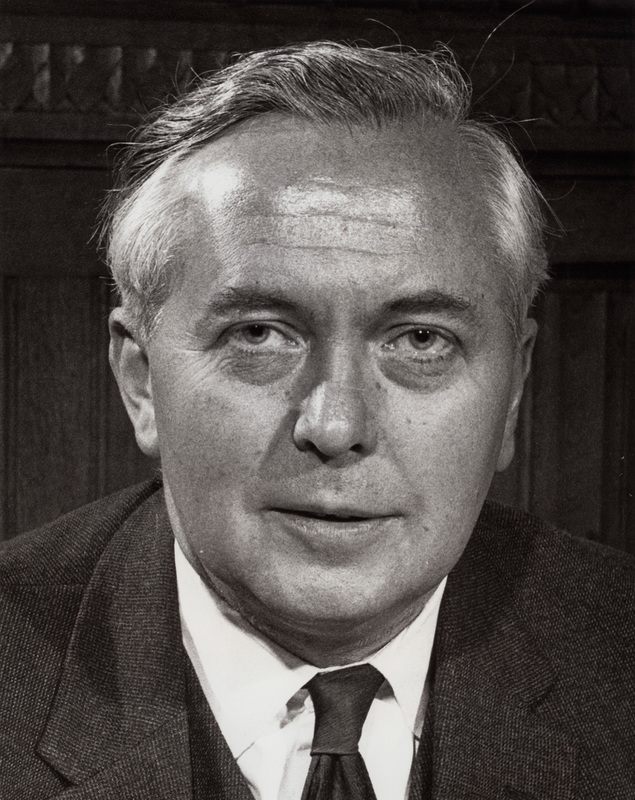Harold Wilson słynne cytaty
Harold Wilson: Cytaty po angielsku
“I have always said about Tony [Benn] that he immatures with age.”
Interview with The Times (7 April 1981), p. 12.
Post-Prime Ministerial
Interview with The Times (7 April 1981), p. 12.
Speech to the Labour Party Conference in Blackpool (28 September 1965), quoted in The Times (29 September 1965), p. 5.
Prime Minister
Television broadcast (October 1964), after winning the general election, quoted in David Butler, Coalitions in British Politics (Macmillan, London, 1978), p. 99.
Prime Minister
Speech at a luncheon in the House of Commons to commemorate the centenary of Ramsay MacDonald's birth (12 October 1966), quoted in The Times (13 October 1966), p. 12.
Prime Minister
Speech in the House of Commons (5 December 1974) http://hansard.millbanksystems.com/commons/1974/dec/05/prime-minister-visits
Prime Minister
Speech to the Labour Party Conference in Blackpool (28 September 1965), quoted in The Times (29 September 1965), p. 5.
Prime Minister
Speech in the House of Commons (20 June 1966) http://hansard.millbanksystems.com/commons/1966/jun/20/seamens-strike, referring to the organisers of a Seamen's strike. Wilson meant to imply they were Communists. Among the union officials offended by this quote was John Prescott.
Prime Minister
Broadcast (25 May 1974), referring to the Ulster Workers Council strike, quoted in The Times (27 May 1974), p. 2
Prime Minister
Speech to the Labour Party Conference in Blackpool (28 September 1965), quoted in The Times (29 September 1965), p. 5.
Prime Minister
Speech at a luncheon in the House of Commons to commemorate the centenary of Ramsay MacDonald's birth (12 October 1966), quoted in The Times (13 October 1966), p. 12.
Prime Minister
Speech in Nottingham (6 February 1970), quoted in The Times (7 February 1970), p. 1 and Philip Whitehead, The Writing on the Wall: Britain in the Seventies (London: Michael Joseph, 1985), p. 40
Prime Minister
Speech at Labour Party conference (1 October 1963), quoted in Labour Party Annual Conference Report, 1963, pp. 139-140. Usually quoted as "the white heat of the technological revolution".
Leader of the Opposition
Speech to Labour Party conference (30 September 1975), quoted in Labour Party Annual Conference Report 1975, pp. 186-187.
Prime Minister
Speech http://hansard.millbanksystems.com/commons/1971/nov/25/northern-ireland-1 in the House of Commons (25 November 1971)
Leader of the Opposition
Speech in the House of Commons (3 November 1964) http://hansard.millbanksystems.com/commons/1964/nov/03/debate-on-the-address-first-day. The 1964 general election had seen the defeat of Wilson's Shadow Foreign Secretary Patrick Gordon Walker by Conservative Peter Griffiths after an allegedly racist campaign. Griffiths was indeed defeated at the next election but returned to Parliament in 1979 and served until 1997.
Prime Minister
“Hughie, get your tanks off my lawn.”
Statement to trade union leader Hugh Scanlon (c. 1969), as quoted in "Lord Scanlon" in The Telegraph (28 January 2004) http://www.telegraph.co.uk/news/obituaries/1452770/Lord-Scanlon.html
Prime Minister
Leader of the Opposition
Speech in the House of Commons (1 November 1965) http://hansard.millbanksystems.com/commons/1965/nov/01/rhodesia. Rhodesia declared independence 10 days later.
Prime Minister
Speech at a May Day rally in London (4 May 1969), quoted in The Times (5 May 1969), p. 1. There had been a series of reports that Wilson's leadership might be challenged.
Prime Minister
Broadcast (12 October 1965), quoted in The Times (13 October 1965), p. 8, calling on the Government of Rhodesia not to declare independence.
Prime Minister
Exchange with BBC interviewer David Dimbleby recorded for a documentary called "Yesterday's Men" broadcast on 16 June 1971. The BBC did agree not to show this portion of the interview, but Wilson's fears of a leak were justified as a transcript was published on page 1 of The Times on June 18, 1971. A fuller transcript appeared in Private Eye during 1972.
Leader of the Opposition
Broadcast http://news.bbc.co.uk/onthisday/hi/dates/stories/november/19/newsid_3208000/3208396.stm (19 November 1967), following the devaluation of the Pound Sterling. Usually remembered as "the Pound in your pocket".
Prime Minister
Speech in the White House (29 July 1966), quoted in The Times (30 July 1966), p. 1.
Prime Minister
“A week is a long time in politics.”
Possibly misattributed; according to Nigel Rees in Brewster's Quotations (1994), asked shortly after his retirement in 1977 about the quote, he could not pinpoint the first occasion on which he uttered the words.
Attributed
Speech to the Consultative Assembly of the Council of Europe, Strasbourg, France (23 January 1967), quoted in The New York Times (24 January 1967), p. 12.
Prime Minister
Speech in the House of Commons (12 November 1956) http://hansard.millbanksystems.com/commons/1956/nov/12/debate-on-the-address; often quoted as "gnomes of Zürich".
Speech to the Labour Party Conference in Blackpool (28 September 1965), quoted in The Times (29 September 1965), p. 5.
Speech during the European Communities membership referendum, quoted in The Times (4 June 1975), p. 5
Prime Minister
Remarks to Barbara Castle (26 April 1975), quoted in Barbara Castle, The Castle Diaries, 1974–76 (Weidenfeld and Nicolson, 1980), p. 379
Prime Minister
